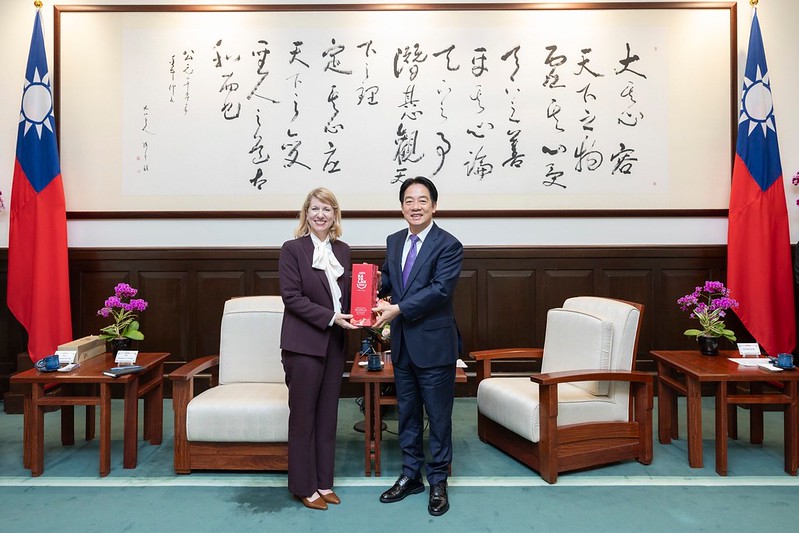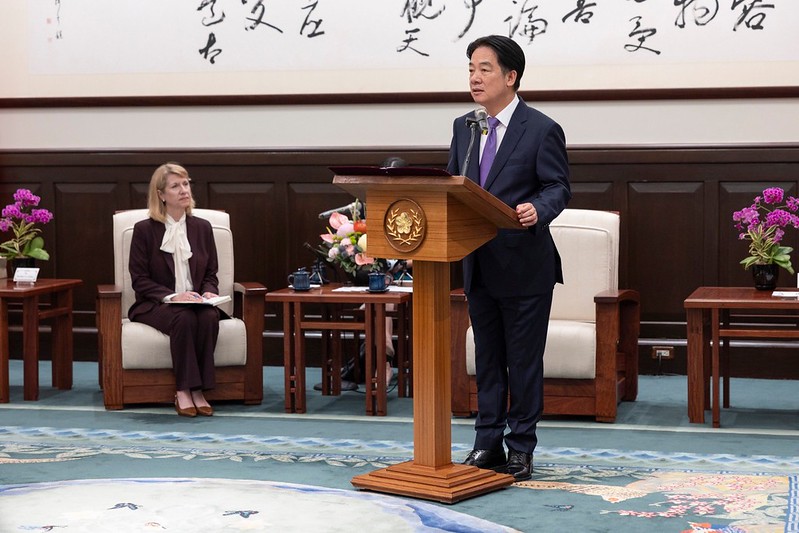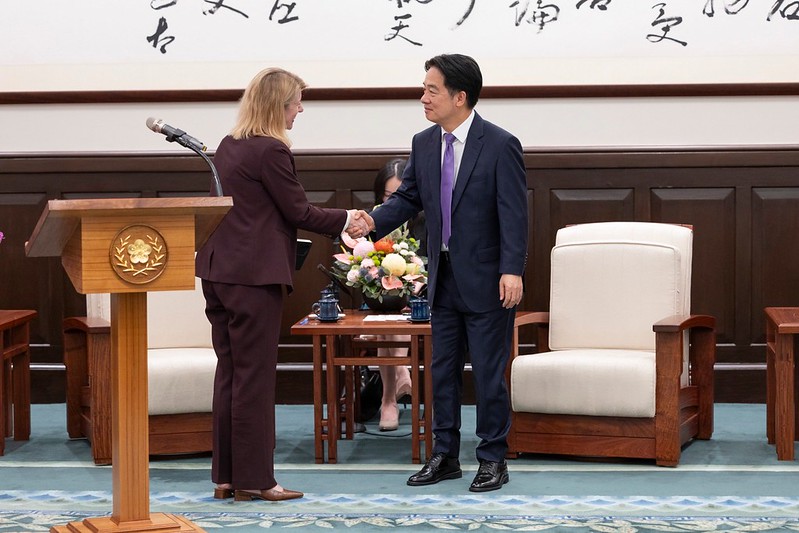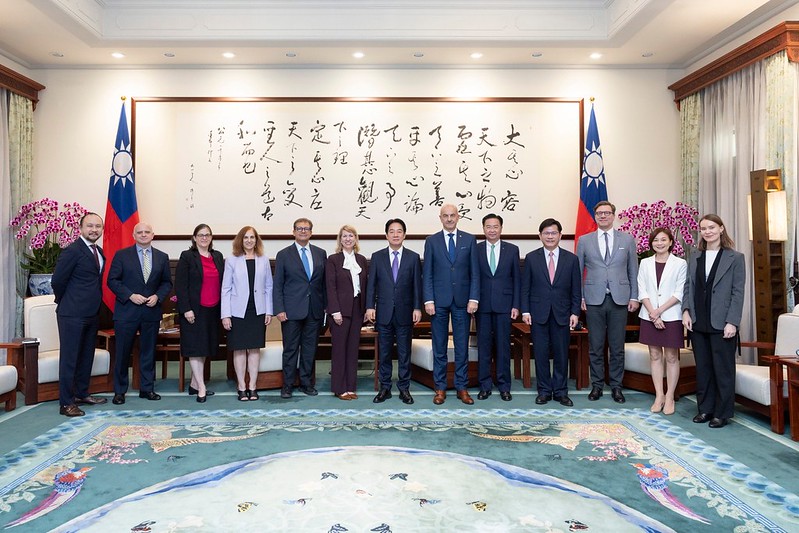News & activities
 News releases
News releases
On the afternoon of October 4, President Lai Ching-te met with a transatlantic delegation from the German Marshall Fund (GMF). In remarks, President Lai stated that as China continues to intimidate and threaten Taiwan both politically and militarily, Taiwan has continued to increase its defense budget and that it is aiming to strengthen resilience in national defense, economic livelihoods, disaster prevention, and democracy to safeguard regional stability and ensure the sustainable development of democracy. The president stated that we seek to work with other democracies to uphold the democratic umbrella and that he looks forward to further advancing economic exchanges and cooperation with the United States and European Union as we unite to face the threats of authoritarian expansionism.
A translation of President Lai’s remarks follows:
I welcome the delegation led by GMF Senior Advisor Heather A. Conley. As Typhoon Krathon has been affecting Taiwan these few days, the presence of our esteemed guests from the United States and Europe here today demonstrates your staunch support for Taiwan and the solid stance our transatlantic partners have taken with Taiwan. On behalf of the people of Taiwan, I extend a very warm welcome to the delegation.
GMF has long paid close attention to cross-strait issues. For instance, it released a research report on United Nations General Assembly Resolution 2758. The report pointed out that the resolution does not mention Taiwan and explained to the international community that China has distorted the content of the resolution and improperly linked it with its “one China principle.” I want to take this opportunity to thank Managing Director of the Indo-Pacific Program at the GMF Bonnie Glaser for her efforts and support in this regard.
In recent years, the US has continued to coordinate with its allies to reiterate the importance of maintaining peace and stability across the Taiwan Strait. And the GMF has contributed greatly to garnering support for Taiwan among the transatlantic alliance. For this, I convey my heartfelt appreciation.
China continues to intimidate and threaten Taiwan both politically and militarily. It is expanding its military presence in the East and South China Seas and attempting to change the rules-based international order. In response, Taiwan has continued to increase its defense budget, established a new defense innovation unit, and set up the Whole-of-Society Defense Resilience Committee at the Presidential Office. Our aim is to strengthen resilience in national defense, economic livelihoods, disaster prevention, and democracy. By making Taiwan more resilient, we are safeguarding regional stability and ensuring the sustainable development of democracy.
Indeed, Taiwan is determined to protect democracy. We seek to work with other democracies to uphold the democratic umbrella and avert the threats of expanding authoritarianism. In terms of Taiwan-US military cooperation, I would like to thank former US Assistant Secretary of State for Political-Military Affairs Jessica Lewis for her tremendous assistance in facilitating the US government’s efforts to accelerate the provision of the defense capabilities Taiwan needs through such avenues as the presidential drawdown authority and Foreign Military Financing program.
Apart from military cooperation, economic cooperation is also crucial. We hope that Taiwan and the US can resolve the issue of double taxation as soon as possible. This would further enhance our bilateral trade and economic ties. We also look forward to signing a bilateral investment agreement with the EU to further advance economic exchanges and cooperation.
Facing the threats of authoritarian expansionism, democracies must unite. Only then will we be able to respond with our collective wisdom and strength. Taiwan needs the world, just as the world needs Taiwan. Taiwan will continue working together with our partners in the US and Europe. I look forward to our discussion.
Senior Advisor Conley then delivered remarks, thanking President Lai for giving them his time and mentioning that this three-day visit, which coincided with the typhoon, demonstrated to them in very concrete terms the importance of the whole-of-society resilience. She said that they were also able to take a deep dive into what President Lai’s administration has put forward on the five pillars, the challenges of implementing this ambitious plan, and the importance of local governments and public opinion.
Noting that the GMF stands for the intersection of democracy, prosperity, and security, and connecting those dots, Senior Advisor Conley remarked how important those connections are in today’s world. She stated that the more complex the international challenges, the more important partners are to helping to solve those problems. That is why the GMF wanted to bring together a transatlantic delegation with colleagues from Europe and the US, she added, who bring together expertise in the technology and economic dimensions of security and civil society. She said that it has been a joy to be with them, to learn together, and to learn from experts in Taiwan as well.
Senior Advisor Conley said that over the past three days, they have had opportunities to brainstorm, provide new ideas, and take home new ideas, and that they look forward to writing about them and helping and continuing this important dialogue. In closing, on behalf of her colleagues and the GMF, she thanked President Lai for giving them an extraordinary three days of conversation and for making time out of his busy schedule in a week of a natural disaster in Taiwan.
The delegation also included former Permanent Representative of Italy to NATO Francesco M. Talò, Chief of the General Staff of the Polish Armed Forces Lieutenant General Rajmund Andrzejczak, GMF Board of Trustees Chair Christopher Schroeder, Special Competitive Studies Project Senior Advisor Joe Wang, and Munich Security Conference Senior Fellow Nico Lange.












